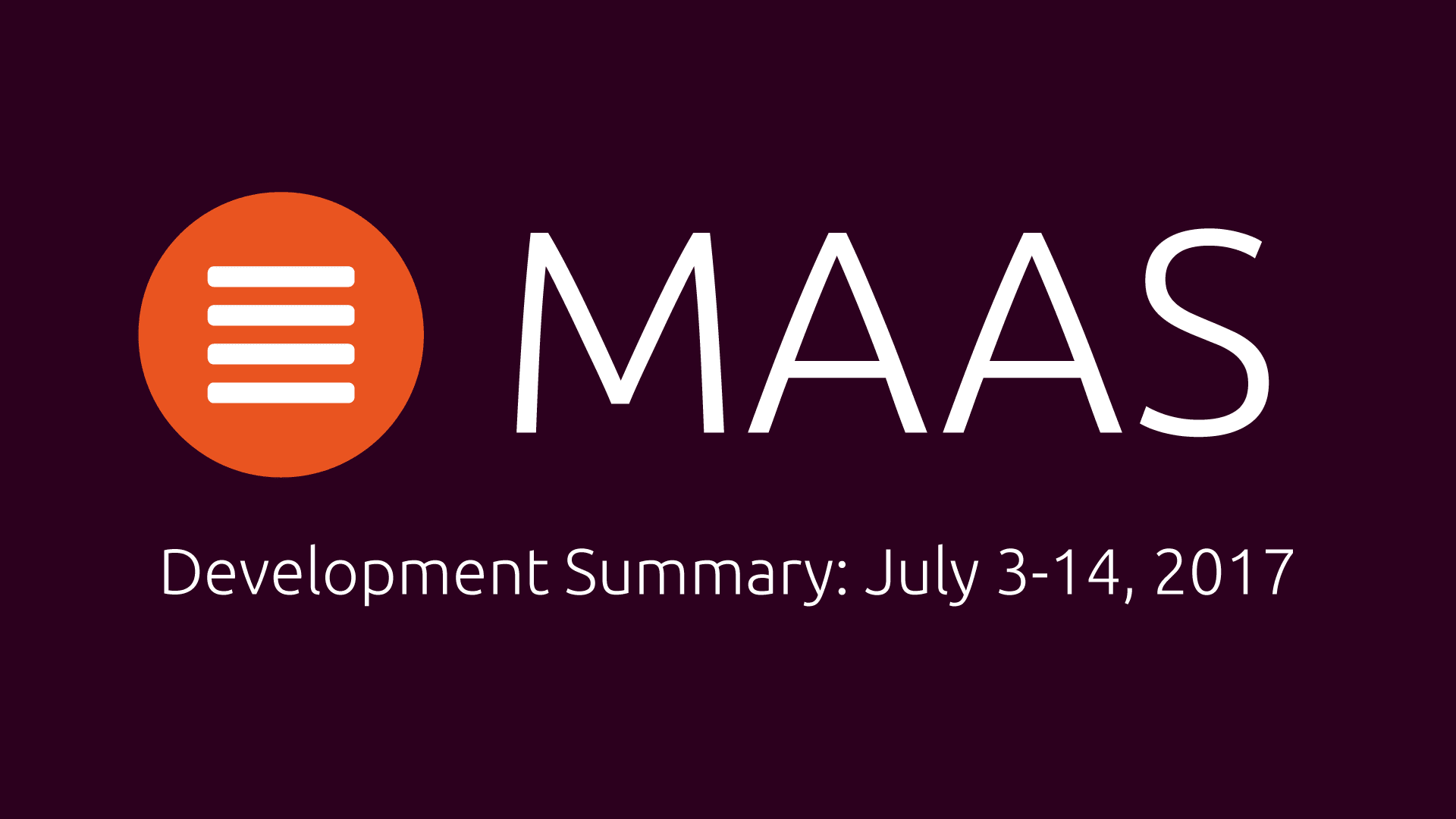MAAS Development Summary – July 3rd – 14th
Canonical
on 11 July 2017

Hello MAASters!
The purpose of this update is to keep our community engaged and informed about the work the team is doing. We’ll cover important announcements, work-in-progress for the next release of MAAS and bugs fixes in release MAAS versions.
MAAS 2.3 (current development release)
- Completed Django 1.11 transition
-
-
- MAAS 2.3 snap will use Django 1.11 by default.
- Ubuntu package will use Django 1.11 in Artful+
-
- Network beaconing & better network discovery
-
-
- MAAS now listens for [unicast and multicast] beacons on UDP port 5240. Beacons are encrypted and authenticated using a key derived from the MAAS shared secret. Upon receiving certain types of beacons, MAAS will reply, confirming the sender that existing MAAS on the network has the same shared key. In addition, records are kept about which interface each beacon was received on, and what VLAN tag (if any) was in use on that interface. This allows MAAS to determine which interfaces observed the same beacon (and thus must be on the same fabric). This information can also determine if [what would previously have been assumed to be] a separate fabric is actually an alternate VLAN in an existing fabric.
- The maas-rack send-beacons command is now available to test the beacon protocol. (This command is intended for testing and support, not general use.) The MAAS shared secret must be installed before the command can be used. By default, it will send multicast beacons out all possible interfaces, but it can also be used in unicast mode.
- Note that while IPv6 support is planned, support for receiving IPv6 beacons in MAAS is not yet available. The maas-rack send-beacons command, however, is already capable of sending IPv6 beacons. (Full IPv6 support is expected to make beacons more flexible, since IPv6 multicast can be sent out on interfaces without a specific IP address assignment, and without resorting to raw sockets.)
- Improvements to rack registration are now under development, so that users will see a more accurate representation of fabrics upon initial installation or registration of a MAAS rack controller.
-
- Bug fixes
-
- LP: #1701056: Show correct information for a device details page as a normal user
- LP: #1701052: Do not show the controllers tab as a normal user
- LP: #1683765: Fix format when devices/controllers are selected to match those of machines
- LP: #1684216 – Update button label from ‘Save selection’ to ‘Update selection’
- LP: #1682489 – Fix Cancel button on add user dialog, which caused the user to be added anyway
- LP: #1682387 – Unassigned should be (Unassigned)
MAAS 2.2.1
The past week the team was also focused on preparing and QA’ing the new MAAS 2.2.1 point release, which was released on Friday June the 30th. For more information about the bug fixes please visit the following https://launchpad.net/maas/+milestone/2.2.1.
MAAS 2.2.1 is available in:
- ppa:maas/stable
Ubuntu cloud
Ubuntu offers all the training, software infrastructure, tools, services and support you need for your public and private clouds.
Newsletter signup
Related posts
Experience Edge AI use cases with Canonical at Mobile World Congress Barcelona 2025
Artificial Intelligence and Machine Learning (AI/ML) are increasingly driving change in telecommunications. Increased adoption is building organizational...
5G without compromise: Building mission-critical private networks for Industry 4.0 with open source
Enterprises across industry verticals are looking for new ways to increase the efficacy of their businesses. One way to do this is building an efficient...
Cloud-native telecom infrastructure with Canonical Kubernetes at Mobile World Congress Barcelona 2025
At this year’s Mobile World Congress, we’re excited to showcase the capability of Canonical Kubernetes LTS (long-term support), which brings up to 12 years of...
